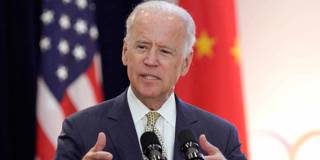While some in China have interpreted US President Joe Biden’s recent overture to Chinese President Xi Jinping as a sign of American weakness, nothing could be further from the truth. In the intervening weeks, the administration has shown that it is serious about reimagining and rebuilding US foreign policy in the Indo-Pacific region.
NEW YORK – Following the news that US President Joe Biden and Chinese President Xi Jinping talked by phone on September 9, there has been much speculation about what the two discussed. Biden has denied a report that Xi turned down a proposed summit, and China’s government spokesman has said only that both sides “agreed to maintain regular contact through various means.”
Still, it is clear that the Biden administration is seeking a relationship that manages, if not resolves, areas of divergence, while enabling coordination or even cooperation in areas of common interest. But the Chinese appear determined to link any such cooperation to US concessions. According to Chinese sources, Xi used the call to repeat the blunt conditionality that US Climate Envoy John Kerry encountered during his recent visit to China: America cannot expect cooperation from China unless it “respects China’s core interests.”
“Core interests” is code for an expanding array of absolutist Chinese claims over Taiwan and the South China Sea, and includes its repression of Uyghurs in Xinjiang, Buddhists in Tibet, and dissidents in Hong Kong. China is also insisting that the United States unilaterally withdraw trade sanctions, roll back export restrictions, and stand down on enforcement actions against alleged Chinese state-sponsored cybertheft and other illicit strategies to obtain US intellectual property and personal information.

NEW YORK – Following the news that US President Joe Biden and Chinese President Xi Jinping talked by phone on September 9, there has been much speculation about what the two discussed. Biden has denied a report that Xi turned down a proposed summit, and China’s government spokesman has said only that both sides “agreed to maintain regular contact through various means.”
Still, it is clear that the Biden administration is seeking a relationship that manages, if not resolves, areas of divergence, while enabling coordination or even cooperation in areas of common interest. But the Chinese appear determined to link any such cooperation to US concessions. According to Chinese sources, Xi used the call to repeat the blunt conditionality that US Climate Envoy John Kerry encountered during his recent visit to China: America cannot expect cooperation from China unless it “respects China’s core interests.”
“Core interests” is code for an expanding array of absolutist Chinese claims over Taiwan and the South China Sea, and includes its repression of Uyghurs in Xinjiang, Buddhists in Tibet, and dissidents in Hong Kong. China is also insisting that the United States unilaterally withdraw trade sanctions, roll back export restrictions, and stand down on enforcement actions against alleged Chinese state-sponsored cybertheft and other illicit strategies to obtain US intellectual property and personal information.